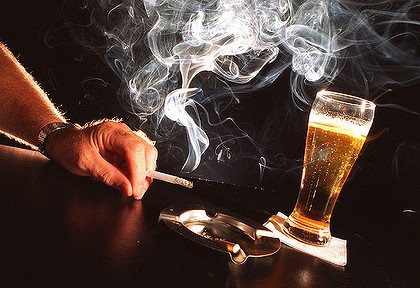Smoking and Alcohol Addiction
Manage your Addiction
People who drink alcohol often also smoke and vice versa. Several mechanisms may contribute to concurrent alcohol and tobacco use. These mechanisms include genes that are involved in regulating certain brain chemical systems; neurobiological mechanisms, such as cross–tolerance and cross–sensitization to both drugs; conditioning mechanisms, in which cravings for alcohol or nicotine are elicited by certain environmental cues; and psychosocial factors (e.g., personality characteristics and coexisting psychiatric disorders).
Treatment outcomes for patients addicted to both alcohol and nicotine are generally worse than for people addicted to only one drug, and many treatment providers do not promote smoking cessation during alcoholism treatment. Recent findings suggest, however, that concurrent treatment for both addictions may improve treatment outcomes.
